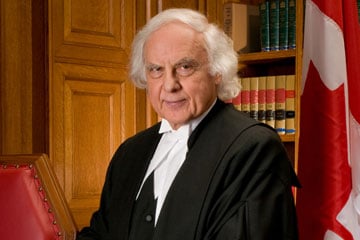

Five lawyers were appointed to the Order of Canada last week, in a milestone year marking Canada’s 150th birthday and the order’s 50th anniversary.
On Dec. 30, Governor General of Canada David Johnston announced the 100 new appointments, saying in a news release all Canadians should be inspired by the accomplishments of their fellow countrymen and women and “use this occasion to build a smarter and more caring country in which every individual can succeed to the greatest extent possible.”
Retired Supreme Court justice Morris Fish was appointed a Companion of the Order of Canada for his “eminent service” as a jurist, particularly on the SCC bench from 2003-13. A law graduate from McGill University, Fish practiced mostly in Quebec — though he was called to the bars of Prince Edward Island and Alberta as well — and also lectured at various Canadian law schools including holding the post of adjunct professor at his alma mater and teaching at the University of Ottawa and the Université de Montréal. His focus in practice and in his teaching was criminal law.
Appointed to Officers of the Order of Canada are Ellen Irene Picard and Paul Cronin Weiler.
Picard was appointed for her contributions as a judge at the Court of Queen’s Bench and her further elevation to the Court of Appeal. She is forefront in the field of health law in Canada, having helped to establish it through her work as a legal scholar. She co-authored Legal Liability of Doctors and Hospitals in Canada, a book widely regarded as the most comprehensive text on the subject.
A graduate of Osgoode Law School in Toronto, Weiler went on to become a professor of law at his alma mater as well as visiting professor of Canadian studies at Harvard Law School, where he got his Masters of Laws years earlier. He was appointed for “his contributions to reforming labour and employment standards as one of North America’s foremost legal scholars,” including serving as a panelist in the United States/Canada Free Trade Agreement softwood lumber arbitration in 1992.
Benoît Pelletier, for “his efforts to bring about interprovincial-territorial co-operation and for his advocacy on behalf of Francophone communities,” and Alfred Popp, for his “contributions to maritime law” in various positions, were named Members of the Order.
Pelletier, currently a law professor at the University of Ottawa where he also earned his Masters Degree in law, was an active political figure between posts at the university, as well as the author of many books, articles and opinion pieces. A supporter of the federalist cause in Quebec, Pelletier departed from traditional policy by also seeking to help Francophone minority groups from other parts of the country resist assimilating with the English-speaking majority. He is still called upon to comment on constitutional matters.
Following a legal education in South Africa, Popp completed his Masters Degree in law at the University of Ottawa. A member of the Canadian delegation to the Legal Committee of the International Maritime Organization — where he eventually became president — Popp was a driving force in developing major international agreements in the field of maritime law. Retiring from the committee in 2005, Popp was appointed administrator of the Ship-source Oil Pollution Fund two years later.
The Order of Canada, one of Canada’s highest civilian honours, was established in 1967, during Canada’s centennial year, to recognize outstanding achievement, dedication to the community and service to the nation. More than 6,000 Canadians have been invested into the Order since its creation. To celebrate its 50th anniversary, there will be multiple special initiatives and partnerships announced throughout the year.
This year’s recipients will be invited to accept their insignia at a ceremony to be held at a later date.